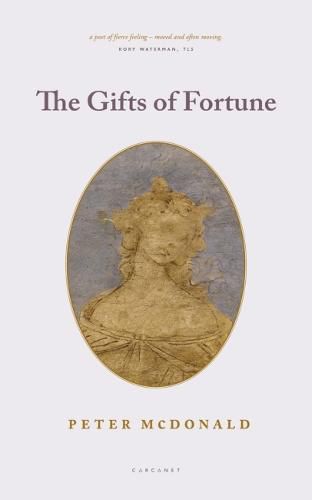Readings Newsletter
Become a Readings Member to make your shopping experience even easier.
Sign in or sign up for free!
You’re not far away from qualifying for FREE standard shipping within Australia
You’ve qualified for FREE standard shipping within Australia
The cart is loading…






The poems in The Gifts of Fortune, Peter McDonald’s seventh book of poems, cover a spectrum of personal history. They go to Belfast, Oxford, and further afield; in time they visit the poet’s pasts, his now, his possible futures. Autobiographical detail abounds: McDonald’s experiences (as a workingclass boy in Belfast, who dreams of leaving, and a middleaged Oxford don, who dreams of going back) are filtered through a deep instinct for poetic tradition. At the heart of the book are two sequences: one, ‘Mud’, in which family, professional, and literary histories are combined in strictly formal, but personally unguarded, reflections on poetry, class, and privilege; and another, ‘Blindness’, where a series of tenline units test poetic form to (and beyond) breaking-point, in a meditation on family and suffering, disappointment and hope. Other poems return to themes of wealth and poverty, love and loss, and the alienation and puzzlement of age. Throughout the book, form is ghosted by the formless, hovering just beyond the frame; and Fortune vies with Fate, quite another force.
$9.00 standard shipping within Australia
FREE standard shipping within Australia for orders over $100.00
Express & International shipping calculated at checkout
The poems in The Gifts of Fortune, Peter McDonald’s seventh book of poems, cover a spectrum of personal history. They go to Belfast, Oxford, and further afield; in time they visit the poet’s pasts, his now, his possible futures. Autobiographical detail abounds: McDonald’s experiences (as a workingclass boy in Belfast, who dreams of leaving, and a middleaged Oxford don, who dreams of going back) are filtered through a deep instinct for poetic tradition. At the heart of the book are two sequences: one, ‘Mud’, in which family, professional, and literary histories are combined in strictly formal, but personally unguarded, reflections on poetry, class, and privilege; and another, ‘Blindness’, where a series of tenline units test poetic form to (and beyond) breaking-point, in a meditation on family and suffering, disappointment and hope. Other poems return to themes of wealth and poverty, love and loss, and the alienation and puzzlement of age. Throughout the book, form is ghosted by the formless, hovering just beyond the frame; and Fortune vies with Fate, quite another force.